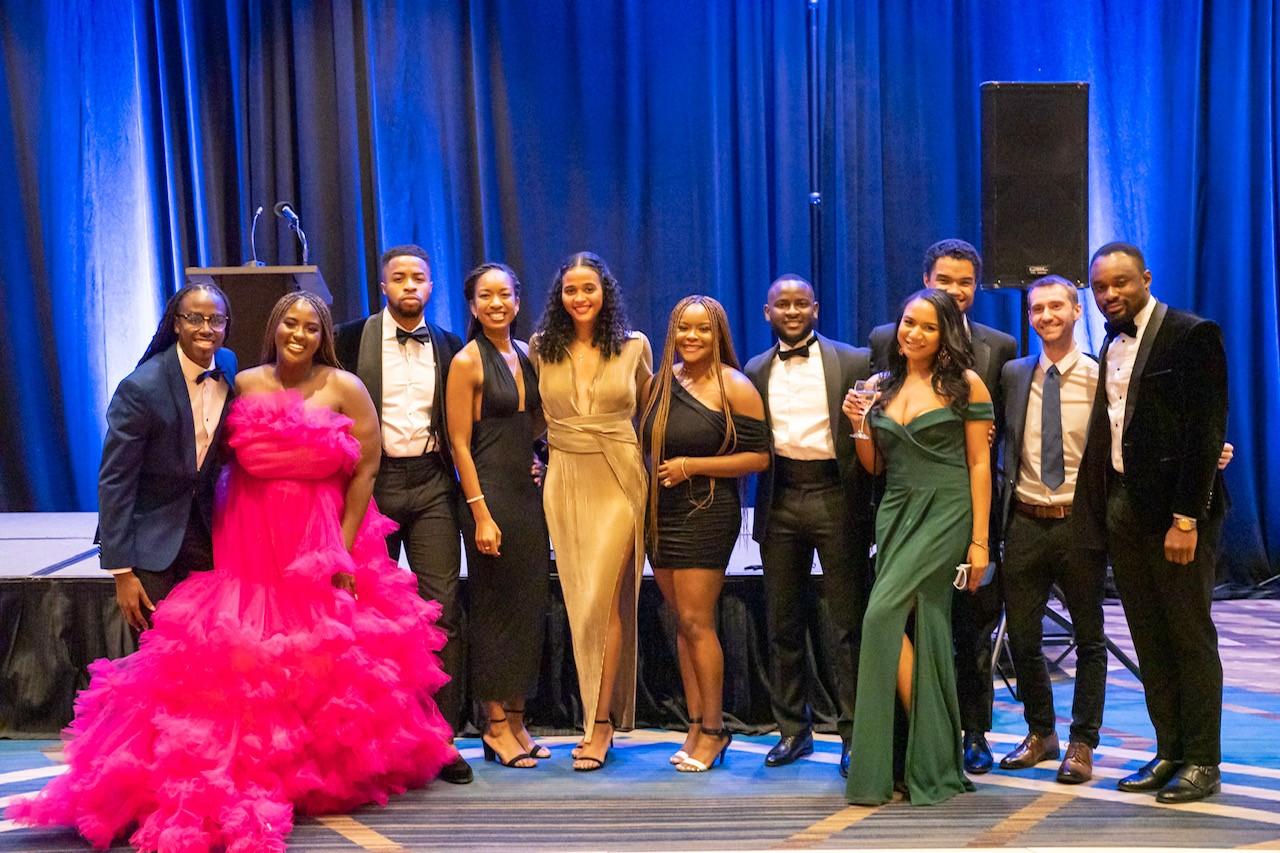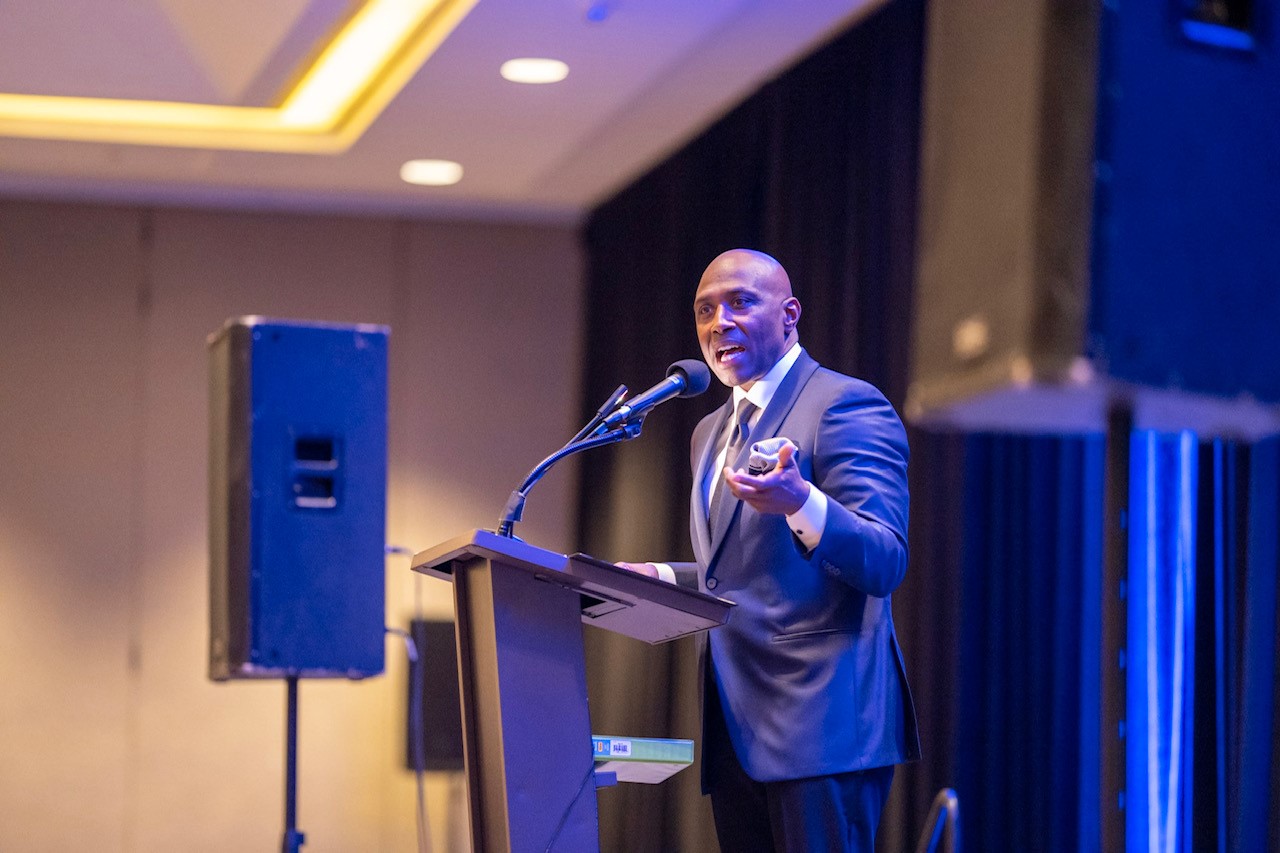UVA Darden Black Business Student Association Celebrates the Black Darden Experience

By Emily Freehling
Starting her MBA experience in an all-virtual learning environment in the midst of the COVID-19 pandemic, University of Virginia Darden School of Business student Oluwaseyi “Seyi” Oyenekan (Class of 2022) saw very quickly how important finding community can be to success in business school, especially for students of color.
On 5 February, as she gathered with more than 100 other Darden students, alumni and faculty at the Black Business Students Association’s (BBSA) Black Excellence Gala, Oyenekan hoped she was seeing the start of a new tradition that will be a touchstone for connecting the Black Darden community for years to come.
Oyenekan, president of the BBSA, said the student club launched the event this year with the theme of Reimagining our Legacy. “We wanted this to be an event where we reimagined what it means to be Black at Darden,” she said.
The BBSA was the first introduction that Nicole Lindsay (MBA ’99/JD ’00) had to Darden, when the group was called the Black Business Students Forum (BBSF). “The first time I stepped on Darden Grounds was for a BBSF conference,” she said. “It was really important for me to see successful people who looked like me.”
Lindsay, who is chief operating officer of sustainability and the Center for Inclusive Growth at Mastercard, delivered the keynote address at the gala. She urged attendees to take the time to cultivate their own joy, happiness and resilience, and reminded them that while achievements and accolades are important, they aren’t the only ingredients necessary for a fulfilling life and career.
At the event, the BBSA presented the Black Excellence Alumni Award to Nicholas Stuart (MBA ’05) in recognition of his work to establish an endowed scholarship that will support a Black student entering Darden’s full-time MBA program. The scholarship will be named in honor of Professor Greg Fairchild. The idea for the scholarship came out of discussions Stuart had with his fellow classmates as he connected with them through virtual events hosted by Darden during the pandemic.
The Black Excellence Gala marked a welcome chance to gather in a festive setting after months of pandemic lockdowns, and alumni traveled from around the U.S. to attend. Oyenekan even flew back from her study-abroad experience in Mexico City.
The gala was made possible in part through the Darden Annual Fund’s sponsorship of the BBSA. The sponsorship was established this year thanks to giving to the annual fund’s Diversity, Equity and Inclusion Initiatives designation, which was launched in 2020 to foster an inclusive community that enables its global and diverse members to collaborate and excel.
While annual fund-supported scholarship programs such as the Impact Fellows and Breakthrough Scholars help Darden recruit classes that are more diverse, Darden School Foundation President Michael Woodfolk said enabling opportunities like this for students and alumni to interact is incredibly valuable as they improve the student experience and strengthen the dynamic Darden network.
Creating an experience of coming together was exactly what Oyenekan and her fellow BBSA board members had worked for the past several months to create, and it was part of a larger strategy to strengthen the ties the BBSA builds among Black students, alumni and prospective students at Darden.
The work is paying off, as BBSA membership has grown dramatically this year, according to Oyenekan.
“The BBSA plays a really unique role in helping Black students navigate being new in Charlottesville,” she said. “The Black Darden community is a special family, but it can be hard to connect with people across the years. The goal is to create a network where we can all stay connected, we can help each other navigate corporate America, and our journey together goes beyond our two years at Darden.”
Megan Scott (Class of 2023), who helped plan the event as the BBSA’s First Year liaison, said the group helped her to adjust after moving to Charlottesville from Philadelphia.
“Being a minority woman, it’s easy to come to a place that is not necessarily as diverse as a big city like Philadelphia and feel isolated or like there is not a community where I belong,” she said. “BBSA has been a great resource for me.”
Oyenekan said she doesn’t want that to end after she graduates this spring, and she hopes the gala will continue as an annual event.
“I want to come back 20 years from now and see that it’s still a big part of Darden,” she said.
For a full recap and videos from the Black Excellence Gala, view the BBSA’s Black Excellence Gala website.
Darden alumni and supporters seeking ways to engage with Darden’s Black alumni and student communities can contact Rena Pacheco at PachecoR@darden.virginia.edu or +1-434-924-3518.
About the University of Virginia Darden School of Business
The University of Virginia Darden School of Business prepares responsible global leaders through unparalleled transformational learning experiences. Darden’s graduate degree programs (MBA, MSBA and Ph.D.) and Executive Education & Lifelong Learning programs offered by the Darden School Foundation set the stage for a lifetime of career advancement and impact. Darden’s top-ranked faculty, renowned for teaching excellence, inspires and shapes modern business leadership worldwide through research, thought leadership and business publishing. Darden has Grounds in Charlottesville, Virginia, and the Washington, D.C., area and a global community that includes 18,000 alumni in 90 countries. Darden was established in 1955 at the University of Virginia, a top public university founded by Thomas Jefferson in 1819 in Charlottesville, Virginia.
Press Contact
Molly Mitchell
Associate Director of Content Marketing and Social Media
Darden School of Business
University of Virginia
MitchellM@darden.virginia.edu


























































